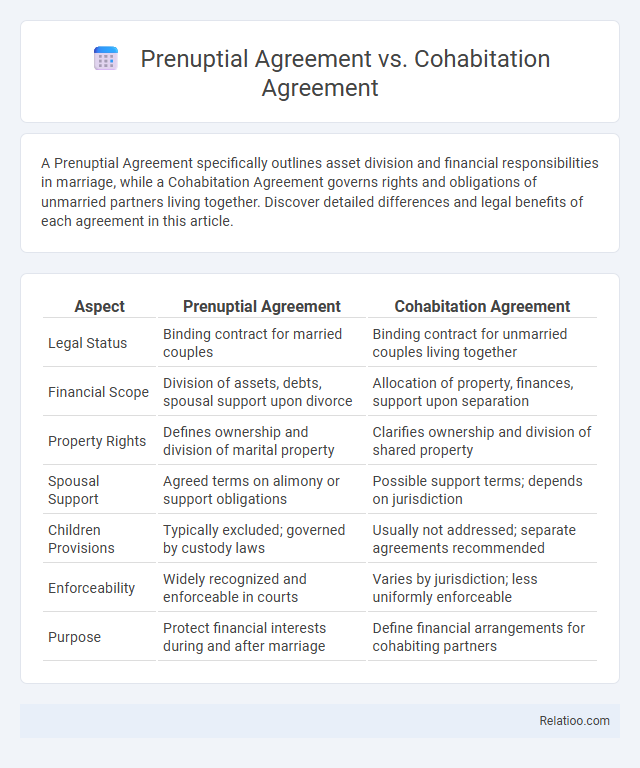A Prenuptial Agreement specifically outlines asset division and financial responsibilities in marriage, while a Cohabitation Agreement governs rights and obligations of unmarried partners living together. Discover detailed differences and legal benefits of each agreement in this article.
Table of Comparison
| Aspect | Prenuptial Agreement | Cohabitation Agreement |
|---|---|---|
| Legal Status | Binding contract for married couples | Binding contract for unmarried couples living together |
| Financial Scope | Division of assets, debts, spousal support upon divorce | Allocation of property, finances, support upon separation |
| Property Rights | Defines ownership and division of marital property | Clarifies ownership and division of shared property |
| Spousal Support | Agreed terms on alimony or support obligations | Possible support terms; depends on jurisdiction |
| Children Provisions | Typically excluded; governed by custody laws | Usually not addressed; separate agreements recommended |
| Enforceability | Widely recognized and enforceable in courts | Varies by jurisdiction; less uniformly enforceable |
| Purpose | Protect financial interests during and after marriage | Define financial arrangements for cohabiting partners |
Understanding Prenuptial Agreements
Prenuptial agreements are legally binding contracts created before marriage to outline the division of assets, debts, and financial responsibilities in case of divorce or death, offering clear protection for both parties. Cohabitation agreements serve a similar purpose but apply to couples living together without marriage, focusing on property rights and financial arrangements during separation. Understanding prenuptial agreements involves recognizing their role in safeguarding individual assets, minimizing conflicts, and providing legal clarity, which differs from cohabitation agreements that address non-marital partnerships.
Overview of Cohabitation Agreements
Cohabitation agreements outline the rights and responsibilities of unmarried couples living together, addressing property division, financial support, and asset protection in case of separation. Unlike prenuptial agreements, which are signed before marriage to manage marital assets, cohabitation agreements apply specifically to couples who choose not to marry but wish to clarify their legal and financial relationship. These agreements help prevent disputes by establishing clear terms for shared expenses, property ownership, and potential inheritance.
Key Differences Between Prenuptial and Cohabitation Agreements
Prenuptial agreements and cohabitation agreements both protect your financial interests, but prenuptial agreements apply exclusively to couples planning to marry, outlining asset division and spousal support in case of divorce. Cohabitation agreements are designed for unmarried couples living together, addressing property rights, financial responsibilities, and dispute resolution should the relationship end. Key differences include legal recognition, scope of protection, and enforceability, with prenuptial agreements having widespread legal clarity compared to the more variable status of cohabitation agreements depending on jurisdiction.
Legal Requirements for Prenuptial Agreements
Prenuptial agreements require strict legal formalities, including full financial disclosure, voluntary consent, and often notarization or witnesses to ensure enforceability. Unlike cohabitation agreements, which may have more flexible requirements depending on jurisdiction, prenuptial agreements typically must comply with specific state laws such as the Uniform Premarital Agreement Act (UPAA). Courts scrutinize prenuptial agreements for fairness, absence of duress, and proper execution to prevent challenges that could invalidate them.
Legal Requirements for Cohabitation Agreements
Cohabitation agreements require clear documentation of property division, financial responsibilities, and support obligations to be legally enforceable. Both parties must fully disclose their assets and enter the agreement voluntarily, often necessitating independent legal advice to meet jurisdiction-specific standards. Unlike prenuptial agreements, which are signed before marriage, cohabitation agreements are designed for couples living together without formal marriage, with varying statutory recognition depending on local laws.
Asset and Property Division Considerations
Prenuptial agreements primarily focus on asset and property division in the event of divorce, clearly outlining how marital and separate properties will be handled, while cohabitation agreements address similar issues but are designed for unmarried couples living together, protecting individual assets and specifying property rights during cohabitation or separation. Understanding the distinctions in these agreements is crucial for Your financial security, as prenuptial agreements involve formal marital status protections, whereas cohabitation agreements provide flexibility without marriage but may offer less legal recognition in some jurisdictions. Choosing the right agreement depends on Your relationship status and the level of protection needed for asset division and property claims.
Spousal Support and Financial Obligations
A prenuptial agreement clearly defines spousal support and financial obligations before marriage, providing legal protection and reducing conflicts in case of divorce. A cohabitation agreement addresses these issues for couples living together without marriage, outlining financial responsibilities and potential spousal support in separation. Your choice between these agreements depends on your relationship status and the level of legal protection you need for financial matters.
Benefits of Having a Prenuptial Agreement
A prenuptial agreement offers clear financial protection by defining asset division and spousal support before marriage, reducing potential conflicts during divorce. Unlike cohabitation agreements, which primarily cover couples living together without marriage, prenups provide legally binding terms tailored specifically for married couples. These agreements safeguard individual property rights and clarify financial expectations, promoting transparency and stability in the marriage.
Advantages of a Cohabitation Agreement
A Cohabitation Agreement offers clear legal protection for couples who live together without marrying, outlining property rights, financial responsibilities, and asset division during separation. It helps prevent disputes by establishing terms for support, debt allocation, and inheritance, tailored to the unique circumstances of non-marital relationships. Unlike Prenuptial Agreements, which apply to married couples, Cohabitation Agreements provide customized solutions for cohabiting partners, ensuring legal clarity and security.
Choosing the Right Agreement for Your Relationship
Choosing the right agreement for your relationship depends on your unique circumstances, such as marital status, asset division, and legal protections desired. A prenuptial agreement is ideal for couples planning to marry, outlining asset division and financial responsibilities in case of divorce. A cohabitation agreement suits unmarried couples living together, addressing property rights, financial support, and responsibilities without marriage.

Infographic: Prenuptial Agreement vs Cohabitation Agreement
 relatioo.com
relatioo.com